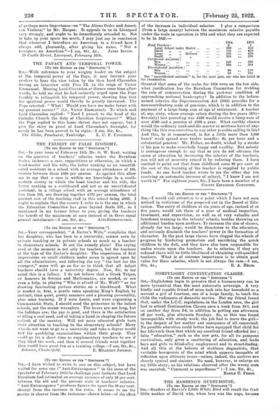[To THE EDITOR OF THE "SPECTATOR."] Si,—I have wished to
write to you on this subject, but have waited for some one (" Anti-Extravagance" in the issue of the Spectator of February 11th) to challenge your footnote that Lord Burnham had estimated an average increase of only 50 per cent. between the -old and the present scale of teachers' salaries. "Anti-Extravagance" produces figures (to upset the 50 per cent. theory) from the increase in the- rates. It-seems to me the matter is clearer from the instances—shown below—of the effect of the increase in individual salaries. I give a comparison (from a large county) between the maximum salaries payable under the scale in operation in 1914 and what they are expected to be in 1923 :—
Head Teachers : 191L
£
1923.
Large School under Master
.. 25e
632 Small „ „ 145 .. 418 Large Mamas .. „ „ .. 185 .. 428
Small MP
105 335 Certlficale,d Assistants:
en 140 380 Women .. 105 .. 304 Uncertificated Assistants:
Men ..
80 .. 228 Women ..
.. 00 ..
182
The " uncertificated assistant" is, for the most part, one who has failed hl the examination.
Granted that some of the scales for 1914 were on the low side, what justification has the Burnham Committee for trebling the rate of remuneration during the post-war condition of approaching national bankruptcy? In addition to the before- named salaries the Superannuation Act (1918) provides for a non-contributory scale of pensions, which is in addition to the payment of a large lump sum at age of retirement. A teacher of, say, sixty, whose average salary during the five years (fifty- five-sixty) last preceding was .2400 would receive a lump sum of over .2500 and a pension of £200 a year. What earthly chance would the ordinary rank-and-file master or mistress have of any- thing like this remuneration in any other possible calling in life? And this, be it remembered, is for a little more than 1,000 hours' work spread over twelve months : 8s. per hour and a substantial pension! Mr. Fisher, no doubt, wished by a stroke of his pen to make everybody happy and wealthy. But nobody is courageous enough to say that as you do not advance the cause of education by increasing the salaries of the teachers, you will not of necessity retard it by reducing them. I have omitted to point out that from childhood some 80 per cent, of the cost of the training of the teacher is supplied by public funds. As one head teacher wrote to me the other day (on receiving an automatic increase of salary), "I know I am not worth it?' For eighteen years, Sir, I have been a member of a COUNTY EDUCATION COMMITTEE.


































 Previous page
Previous page